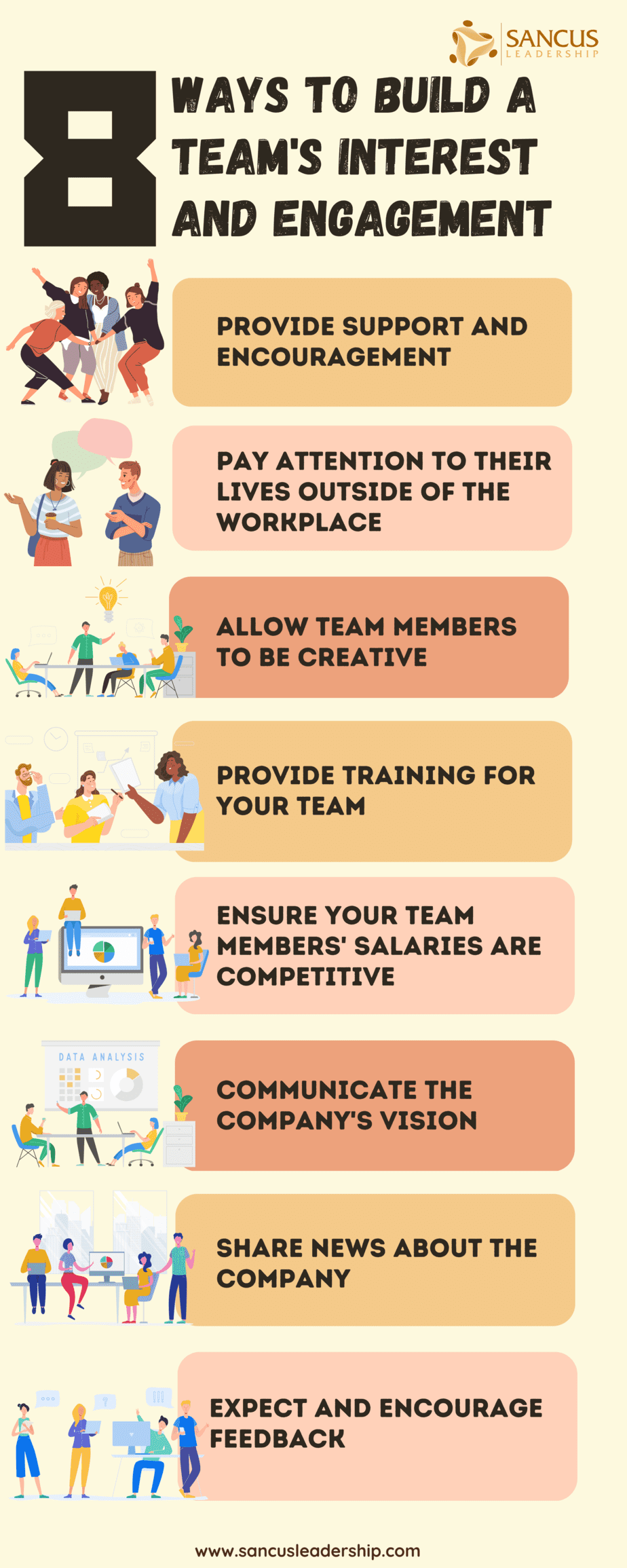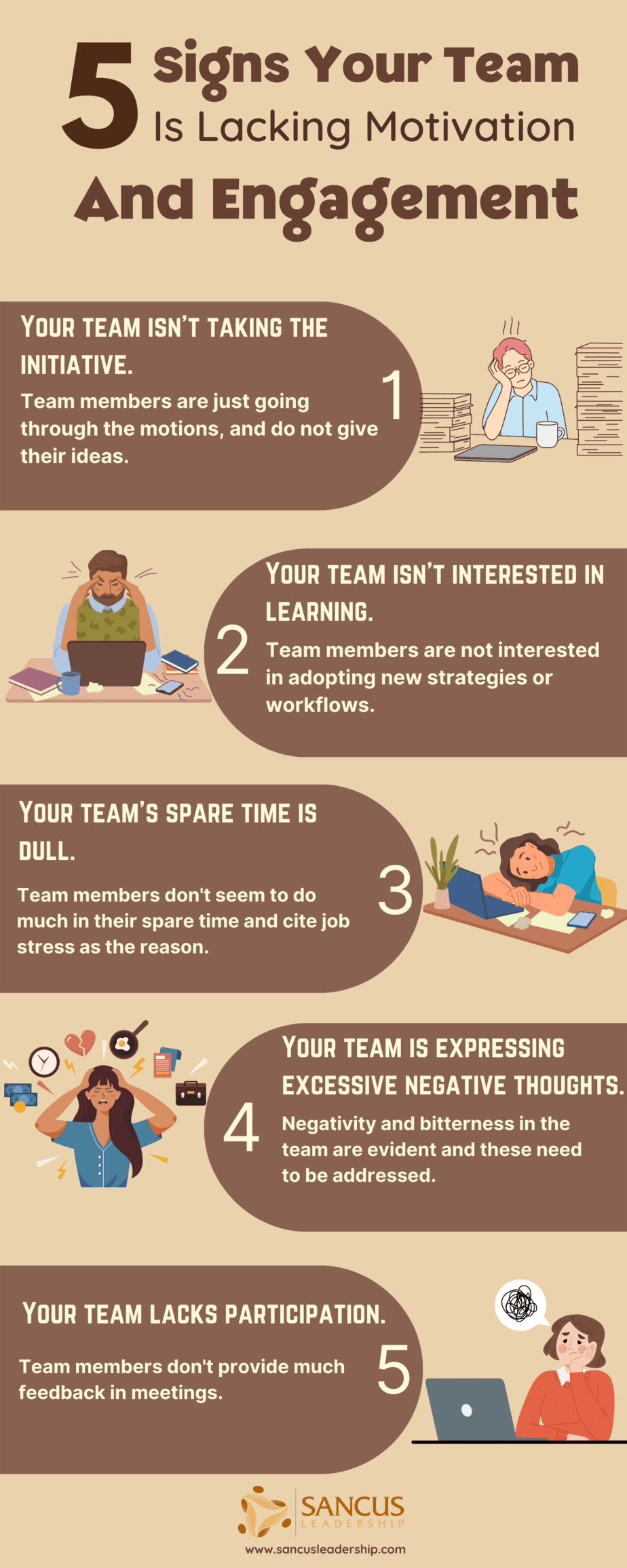Your cart is currently empty!

8 Proven Ways To Build Interest and Engagement on a Team!
I have seen it many times, maybe so have you? People on our team have “disconnected” from work; they no longer feel interested in their daily tasks and projects. This doesn’t predict well for their productivity or the company’s success. So how can you rebuild interest in a team?
You can build interest in a team by offering support to your team members, taking the time to learn who your team members are as people, encouraging a spirit of creativity, and paying your employees what they are worth.

In this article, I’ll share how I did to regain interest in some of the teams I have led and how you can too, and at the end, you’ll find a short team assessment to measure the motivation of your team.
1. Provide Support and Encouragement

Team members can’t achieve their goals if they don’t feel like they’re getting the support they require. This will also stimulate their interest in the work.
Lack of the right support is one of the reasons I left my old job in the Army, I put so much energy and time into making my team as excellent of a bomb disposal force as I could, but in the end, the company couldn’t support the team at the level we needed.
We, as a team, had outrun our chain of command, we started stagnating in our skill development, and it was time to do something different.
Even if you don’t have the financial means, always try to be available to your team members so that you can guide them. It’s also good to check in with them regularly to see if they’re on board with the work or require any additional support.
This way of operating carried us through four deployments, and we became the first team to stick together for this long since the unit was formed.
Here are some ways to support and encourage your team members:
- Have regular one-on-one meetings where you try to understand their inner drives and motivations and use this knowledge to find tasks that align.
- Review their work regularly, and focus on understanding their struggles and how you can help.
- Let them help you choose what tasks should be prioritized.
- Set specific targets and action steps for achieving them together.
2. Pay Attention to Their Lives Outside of the Workplace

If you only speak to your team members about work-related issues, they can feel like they’re not seen on an individual level. Show you care about your team members’ lives. This will help them feel appreciated and seen while encouraging them to be more engaged.
Show you care about your team members’ lives. This will help them feel appreciated and seen while encouraging them to be more engaged.
The key here is that you must truly care for your people for this to work; don’t think you can fake your way through this. People can spot fake considerations in an instance. In another post, I share a story where my boss told me, “Gabriel, I don’t care about you …”. If you want to know how that impacted our entire workplace and the lessons I learned, then you can read it here.
If you don't care, don't ask, then at least you'll be authentic!
Here are ways in which you can show you care:
- Ask your team members how their families are doing. Learn their family members’ names so you can make conversations more personal in the future.
- Ask them about how they would like to spend their free time and if they could do anything. This type of question will help you to see what motivates your team members.
- Find common interests and hang out with your team on the weekends. This has the potential of closing the gap between manager and employee, allowing you to get a more honest picture of the business and make some new awesome friends!
3. Allow Team Members To Be Creative

If your team members have a chance to brainstorm creatively and come up with new solutions to problems, this will encourage them to feel engaged in the work they have to do.
Put yourself in their shoes: if you’re encouraged to come up with an idea for a project, and it gets the green light, you’ll feel more invested in the project. This is the type of interest you want to enhance in your workplace.
Mrs. Creativity is best friends with Mr. Failure, so make sure your workplace has reached a decent level of psychological safety before you encourage people to take risks.
Mrs. Creativity is best friends with Mr. Failure, so make sure your workplace has reached a decent level of psychological safety before you encourage people to take risks.
Here's an article on how to assess your team's level of psychological safety.
It’s also a good idea to encourage your team members to take on projects that are outside of their daily roles. This can encourage increased interest in the job overall.
4. Provide Training for Your Team

Your team members can’t be interested in the team or work well if they’re feeling overwhelmed by their roles and responsibilities. This is why providing training for them is a good idea.
You can also communicate with your team members to find out what their career goals and aspirations are. Getting training can help them achieve these dreams while also benefiting their overall productivity.
Your team members are more likely to be interested and invested in their work if they are able to find ways to follow their own interests and pursue their career ambitions within their career.
Your team members are more likely to be interested and invested in their work if they are able to find ways to follow their own interests and pursue their career ambitions within their career.
5. Ensure Your Team Members’ Salaries Are Competitive

Leading your team with passion and compassion is incredibly important, but these should never take the place of paying your employees what they deserve for the work they do. Their salaries need to be aligned with what employees in other companies are earning.
This is connected to increased engagement. If your employees aren’t getting what they feel they deserve, this will sooner or later cause them to leave their jobs.
A study found that 26% of employees who felt engaged in their work would leave their jobs for a company that offered them a 5% increase in their salaries. Even if your employees are interested in the work and committed to their jobs, money is an essential factor in determining whether or not they stay in the company.
26% of employees who felt engaged in their work would leave their jobs for a company that offered them a 5% increase in their salaries.
6. Communicate The Company’s Vision

A big mistake I see is that companies say something like, “our vision is to be the biggest online retailer for banana protectors” (google it, it’s pretty cool). Firstly, most employees don’t give a crap because they won’t get any benefits from it.
Secondly, they most likely will change jobs in the next five years anyways unless you do this.
To actually make your team members feel interested in their work and be more productive, you should communicate your (and the company’s) purpose.
This has the effect of including your team members on an emotional level, but only if they find that purpose meaningful! This is why one of your main priorities as a team leader is to understand your people’s inner drive and find links between that and the tasks you are giving them.
Sometimes finding this connection can be really difficult, but most of the time, there are opportunities.
To help you better communicate your purpose with your team members, ask yourself questions such as the following:
- What information do my team members need to know about the project we’re working on that will connect with them emotionally?
- How can I use their inner drive to make them feel more interested and engaged in completing it?
- What issues do they have with the current purpose? Can I reframe it in a way that aligns with them?
- How can I support them in the long run, and not just today?

If you’re privileged to information about the company, such as when it comes to its successes and failures, it’s a good idea to pass this on to your team members. It will help them to feel more engaged because it includes them.
We all want to see the impact of our actions, so letting someone know what happens with their report or completed task is another great way of improving engagement.
Also, if they feel engaged in a project, they will be even more invested if they know what still needs to be done as well as how their efforts have been effective. When they experience success, this is a good opportunity for you to praise their efforts, especially since feeling appreciated in the workplace is connected to higher levels of engagement.
Feeling appreciated in the workplace is connected to higher levels of engagement.
8. Expect and Encourage Feedback

One of the biggest ways in which you can help team members feel more interested and engaged is to let them share their opinions. Be open to feedback! Communicating with them about their feelings and concerns can help them feel acknowledged, respected, and valuable to the company.
Create a culture where it is expected for everyone to voice their opinions; not all of the ideas will be followed up, but that’s okay. The idea is to create a place where people feel comfortable being uncomfortable.
You can gain feedback from your team members by:
- 1-on-1 discussions are the most powerful feedback tool; it allows one to ask follow-up questions and really understand the issue or question.
- Having feedback group sessions in which team members can express what they think regarding certain tasks and goals.
This team level of support can go a long way even if the upper management is lacking with their resources; on my team, I maximized our confidence in the team’s ability to solve problems without external help.
| Ways to Build Interest and Engagement on a Team | Explanation |
| 1. Provide Support and Encouragement | Team members need to feel supported to achieve their goals and be interested in the work. |
| 2. Pay Attention to Their Lives Outside of the Workplace | Showing you care about your team members’ lives will make them feel appreciated and encourage them to be more engaged. |
| 3. Allow Team Members To Be Creative | Encouraging team members to brainstorm creatively and come up with new solutions to problems will make them more invested in the project. |
| 4. Provide Training for Your Team | Providing training can help team members achieve their career goals while also benefiting their productivity. |
| 5. Ensure Your Team Members’ Salaries Are Competitive | Paying your employees what they deserve for the work they do will increase engagement and prevent them from leaving their jobs. |
| 6. Communicate Your (and the Company’s) Purpose | Sharing the purpose of the work can make team members feel emotionally invested and interested in their work. |
| 7. Share News About the Company | Sharing information about the company’s successes and failures can help team members feel more engaged and included. |
| 8. Expect and Encourage Feedback | Creating a culture where feedback is expected and encouraged can help team members feel acknowledged, respected, and valuable to the company. |
Here’s an interesting video from TEDx on how feedback from others can make you a better leader:
When team members feel that they are being heard by their superiors, their investment in the company skyrockets. A study found that 92% of employees who were highly engaged in their work felt heard in their workplace, so the two are definitely connected.
When team members feel that they are being heard by their superiors, their investment in the company skyrockets.
5 Signs Your Team Is Lacking Motivation and Engagement
There are some common signs that your team is lacking motivation and engagement, both of which negatively affect their productivity and job satisfaction. You should keep an eye out for the following:

- Your team isn’t taking the initiative. Does it feel like your team just goes through the motions of completing a task? To encourage their creativity, let them brainstorm new ways of doing things.
- Your team isn’t interested in learning. If it seems like your team members aren’t interested in adopting new strategies or workflows, the issue could be that they’re not being supported. Consider coaching or online courses that could help them to feel inspired to tackle new things.
- Your team’s spare time is dull. When speaking to your team members about what they do in their spare time, if they don’t seem to do much or they cite job stress as the reason why they’re sleeping all weekend, this is a red flag of a lack of recovery. Be open to feedback about their work so you can see what’s troubling them and how it can be improved.
- Your team is expressing excessive negative thoughts. Negativity and bitterness in your team are signs of dissatisfaction in the workplace. This warrants a meeting in which team members can talk freely about what they’re experiencing so they can get their mojo back.
- Your team lacks participation. If your team members don’t give you much feedback in meetings, they could be feeling apathetic, or perhaps they’re not seeing the big picture of why their job is important. Now’s the time to talk to them about your and the company’s purpose and help them to align their purpose by discovering what drives them.
Conclusion
Building interest in your team members is important to help them become more productive. You can do this in the following ways:
- Provide support to your team members.
- Build relationships with your team members.
- Allow creativity.
- Communicate the company’s vision.
